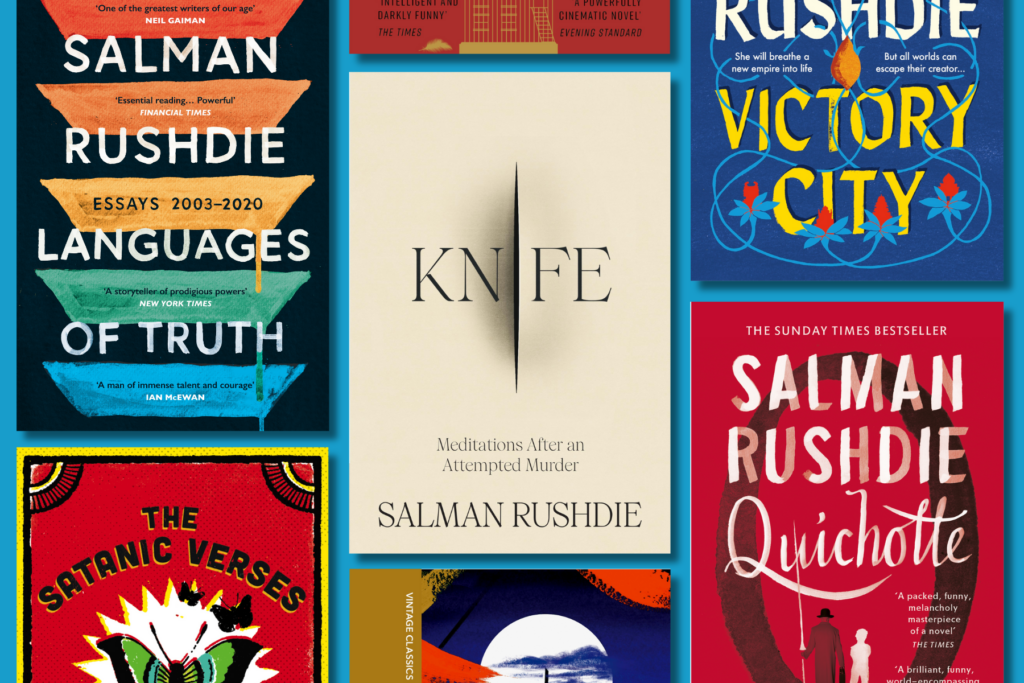- Home |
- Search Results |
- Where to start reading Salman Rushdie

Salman Rushdie is one of the world’s most acclaimed, award-winning contemporary authors. Translated into over 40 languages, he has produced a celebrated body of work now encompassing 16 works of fiction; six works of non-fiction including his brand-new memoir Knife; two plays, one screenplay and two anthologies. Here is a guide for the keen-but-daunted on where to begin with Rushdie’s bibliography.
Midnight’s Children (1981)
"To understand just one life, you have to swallow the world," wrote Salman Rushdie, and he proved it with his most successful novel: the story of Saleem Sinai, a man "handcuffed to history" by being born precisely at the moment of Indian independence: at midnight on 15 August, 1947. As a result, Saleem believes that all the history bubbling up through his galloping narrative – from Nehru to Indira Gandhi, from war with China to the creation of Bangladesh – happens because of him.
A fairy tale, a coming-of-age story and a satire, Midnight’s Children is as "hot, noisy, odorous, crowded and excessive’ (to borrow the novel’s own words) as the country it describes, borrowing from writers like Günter Grass and Gabriel García Márquez but creating something entirely new. It reclaimed English literature in India from its colonial past and created a new strain of fiction as, in Anita Desai’s words, younger writers "rushed to produce their imitations".
In the 40 years since it was published, this funny, ambitious, mind-stretching novel has continued to be both a critical hit and a popular favourite, winning the Booker Prize in 1981 and then topping the poll for the Booker of Bookers in 1993 and the Best of the Booker in 2008 – making it the only book to have won the prize three times.
The Satanic Verses (1988)
Just before dawn one winter’s morning, an aeroplane blows apart high above the English Channel and two figures tumble, clutched in an embrace, towards the sea: Gibreel Farishta, India’s legendary movie star, and Saladin Chamcha, the man of a thousand voices.
Washed up, alive, on an English beach, their survival is a miracle. But there is a price to pay. Gibreel and Saladin have been chosen as opponents in the eternal wrestling match between Good and Evil. But chosen by whom? Who is which? And what will be the outcome of their final confrontation?
Rushdie’s fourth novel, The Satanic Verses became the subject of religious controversy. It was shortlisted for the Booker Prize and, a year after its publication, Iran’s Supreme Leader issued a fatwa that forced Rushdie into hiding for nine years. It was during this time that he became a passionate advocate for freedom of speech and a strong supporter of PEN, the charity that promotes literature and freedom of expression.
Quichotte (2019)
Rushdie’s most recent novel was shortlisted for the Booker Prize and showed that, more than forty years into his career, he was still writing with all the energy, imagination and humour that made him famous.
Using Don Quixote as a springboard, Rushdie gives us a story within a story within a story – Rushdie squared, fiction cubed, satire to the power of satire. It’s about a road trip across Trump’s USA, a world of opioid addiction and screen burnout; but a love story too, about a man who will move heaven and earth to win over a TV star.
Echoes of Cervantes’s classic abound, but above all this book is a love letter to Rushdie’s own omnivorous knowledge of – and love for – modern culture, from Oprah, Vonnegut and Cornershop to Pinocchio, Law & Order and The Real Housewives of Atlanta. Above all, as one character puts it, it’s "colour after a lifetime of black and white".